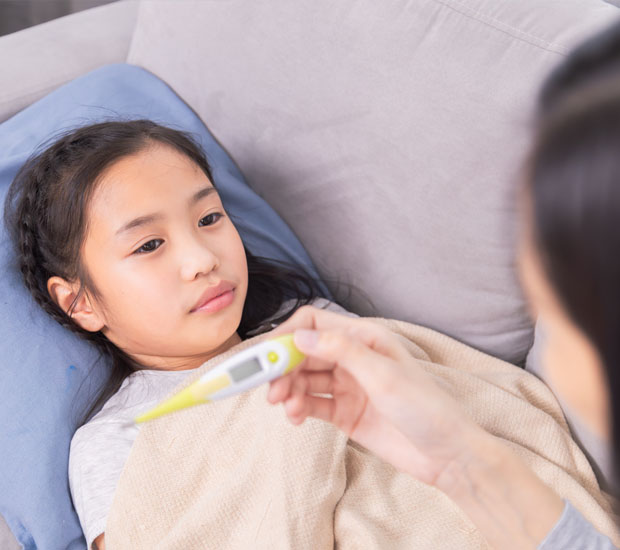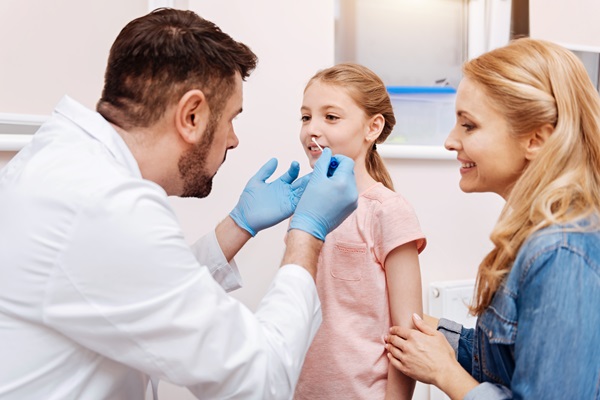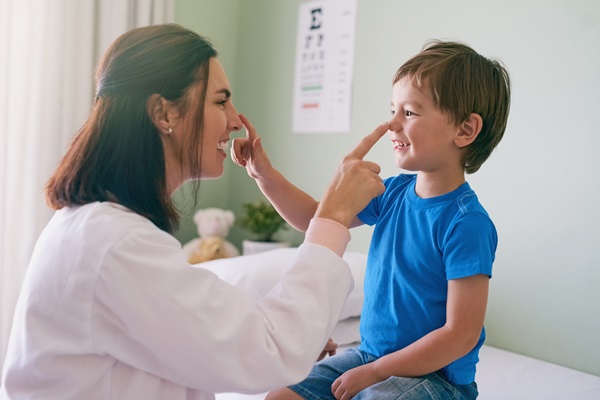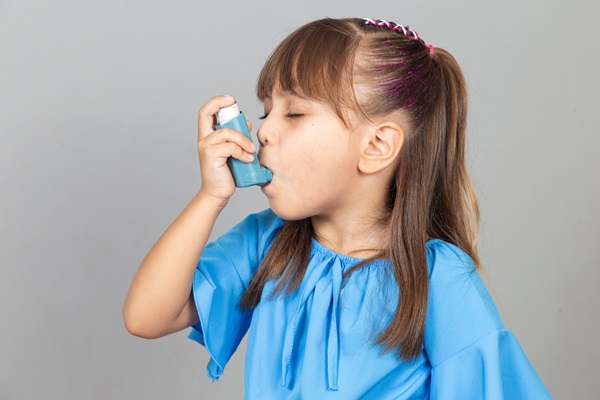Pediatric FeverZachary, LA
Pediatric fevers are one of the most common issues that parents experience when their child is growing up. While it can be scary for a child to have a pediatric fever, most cases of pediatric fever are harmless and are a signal that the child’s immune system is working to fight a viral infection.
The TKZ Pediatrics team understands that it is no fun for you or your little one when they are experiencing a pediatric fever. We are here to help. Call our Zachary office at 1-225-420-1549 to learn more or to schedule an appointment.
What is Pediatric Fever?
According to Stanford Medicine, most healthcare providers define a fever as a body temperature of 100.4 degrees or above when taken rectally. The body has a variety of ways to maintain the child’s normal body temperature. Common responses to changes in temperature include:
- Increasing or decreasing sweat production
- Moving blood away from, or closer to, the surface of the skin
- Getting rid of, or holding on to, water in the body
- Seeking a cooler or warmer environment
When a child is experiencing a fever, their body temporarily resets its thermostat at a higher temperature. This higher temperature can help the immune system better respond to an infection by producing natural antibodies. The body may also be making more macrophage cells, which combat intruding organisms in the body.
“When a child is experiencing a fever, their body temporarily resets its thermostat at a higher temperature.”
Common Symptoms of Pediatric Fever
Young patients experiencing pediatric fever often become more uncomfortable as their body temperature gradually rises. While each child may experience symptoms differently, these are the most common symptoms of pediatric fever:
- Warm to the touch, especially on their forehead, back, or chest
- Sweating
- Headache
- Chills or shivering
- Fatigue or lathargy
- Abnormal irritability or fussiness
- Muscle aches
- Loss of appetite
It is important to remember that pediatric fever symptoms can resemble other medical conditions. According to the American Academy of Pediatrics, if a child younger than two months of age has a rectal temperature of 100.4 degrees Fahrenheit or higher, the parent should call their pediatrician immediately. If they are unsure when to bring their child in, the pediatrician can guide them on how to best monitor the pediatric fever or recommend visiting the office for a diagnosis.
“It is important to remember that pediatric fever symptoms can resemble other medical conditions.”
What Fevers Mean by Age
Pediatric fevers — and their impact — vary by age and can indicate different health concerns depending on the child's developmental stage. For example, in newborns and infants under three months, even a slight fever—typically defined as a rectal temperature of 100.4°F (38°C) or higher—can be a sign of a serious infection, as their immune systems are still developing. Fevers in this age group frequently require immediate medical evaluation. They are more vulnerable to bacterial infections such as meningitis or sepsis.
Toddlers and older children typically have stronger immune systems, and viral infections like the flu or common cold more commonly cause fevers. In children aged six months to five years, fevers are often part of the body's natural defense against infections. However, parents need to watch for signs of febrile seizures, particularly if they have a family history of them.
By the time a child reaches school age, fevers are generally less alarming. That is because they are usually a sign of common viral illnesses. If a fever lasts longer than a couple of days, regardless of the patient's age, they should still be evaluated by a pediatrician to rule out more serious conditions.
“Pediatric fevers — and their impact — vary by age and can indicate different health concerns depending on the child’s developmental stage.”
How to Treat Pediatric Fever at Home
When a child develops a fever, parents can begin by ensuring their child stays hydrated. Fluids like water, clear soups, or electrolyte-rich drinks help prevent dehydration, a common concern during fever. It is also important to dress the child in lightweight clothing. Use a light blanket to keep them comfortable. Avoid bundling them up or swaddling them, which could trap heat and make them feel hotter. A lukewarm bath can help reduce the fever gradually without causing the child to shiver, which could raise their body temperature.
While many fevers resolve on their own, parents can administer age-appropriate fever-reducing medications such as acetaminophen or ibuprofen, following dosage guidelines closely. However, do not use acetylsalicylic acid (Asprin) unless their pediatrician says it is okay to use it. This medicine can cause a rare but dangerous side effect called Reye's syndrome in children and teenagers. This condition can cause permanent brain and liver damage.
It is important for parents to monitor the fever and overall condition of their child rather than relying on the thermometer readings. Create a calm, quiet environment to encourage the child to rest. If the fever persists for more than a couple of days or is accompanied by symptoms like difficulty breathing, severe headache, or rash, parents should call their child's pediatrician.
“It is important for parents to monitor the fever and overall condition of their child rather than relying on the thermometer reading.”
When to Call a Pediatrician About Pediatric Fever
Parents should call their pediatrician if an infant under three months old has a pediatric fever of 100.4°F or higher. This could be a sign of a serious infection. In children older than three months, it is important to reach out if the fever persists for more than two to three days or if the child shows signs of distress, such as difficulty breathing, excessive irritability, or lethargy. At any age, a fever that exceeds 104°F is a cause of concern. A temperature this high can indicate a more severe underlying condition that requires medical attention.
Additionally, parents should call their child's pediatrician if their fever is accompanied by symptoms like a stiff neck, seizures, persistent vomiting, or a rash, as these could be signs of a serious illness. If the child has a weakened immune system or pre-existing medical conditions, they may need immediate treatment for a pediatric fever. No matter the situation, parents should follow their instincts. If something feels off, it is better to err on the side of caution and call our office for guidance or to schedule an appointment.
“If something feels off, it is better to err on the side of caution and call our office for guidance or to schedule an appointment.”
Questions Answered on This Page
Q. What are the common symptoms of pediatric fever?
Q. What is the difference between a pediatric ever in infants and school-age children?
Q. ow can I keep my child comfortable at home when they have a fever?
Q. When should I call my child’s pediatrician when they have a fever?
Call Our Office to Learn More
If your child has a pediatric fever, the TKZ Pediatrics team understands that it can be a worrying experience. We are here to help you care for your child and keep them comfortable until they feel better. Call our Zachary office at 1-225-420-1549 to learn more about pediatric fevers or to schedule an appointment.
Frequently Asked Questions
Q. Can fever-reducing medications prevent febrile seizures?
A. Some children are prone to febrile seizures when their body temperature rises rapidly, often before parents even realize their child has a fever. These seizures can be hereditary and typically occur between the ages of 6 months and six years old. Although scary, febrile seizures that last less than 15 minutes do not cause brain damage. Fever-reducing medications, such as acetaminophen or ibuprofen, can make children feel more comfortable when they have a pediatric fever, no medical evidence supports that they prevent febrile seizures.
Q. Should I treat my child’s fever?
A. Pediatric fevers will typically resolve on their own after the child’s immune system finishes fighting the viral infection. However, to keep them comfortable, encourage them to rest and drink plenty of fluids. Most children do not need to take fever-reducing medications, but acetaminophen and ibuprofen can help them if they have a fever above 103.1 degrees Farenheit. Their dosage will depend on their age and body weight, so be sure to reach out to Dr. Woodroffe if you have questions about how much to give them.
Q. My child’s fever keeps coming back. Is this something I should worry about?
A. If your child's fever keeps recurring, it could indicate an underlying infection or illness. While pediatric fevers are common and often resolve on their own, persistent or returning fevers may be a cause for concern. Be sure to monitor other symptoms, such as difficulty breathing or lethargy.
Q. Are there ways to reduce the risk of fever from infections?
A. All kids with get a fever from time to time. However, you can take preventive steps to reduce the risk of fever from infections by frequent handwashing and avoiding contact with people who are sick with an infection or virus. Additionally, staying updated on vaccinations can help prevent many infections that cause your child to experience a fever.
Q. Should my child favorite avoid certain activities if they recently recovered from a fever?
A. Having a fever causes most children to feel tired and achy. During this time, you should encourage your child to rest as much as they want. However, forcing the child to sleep or rest is unnecessary if they begin to feel better. They can typically return to school or other activities when their temperature has been normal for 24 hours.





